

ICCS Newsletters 01 / Publication / Reviews
2019-03-28
.png)
【Contents】
中心最新出版 Publication
回顧 / 側記 Reviews / Notes
影片 Video
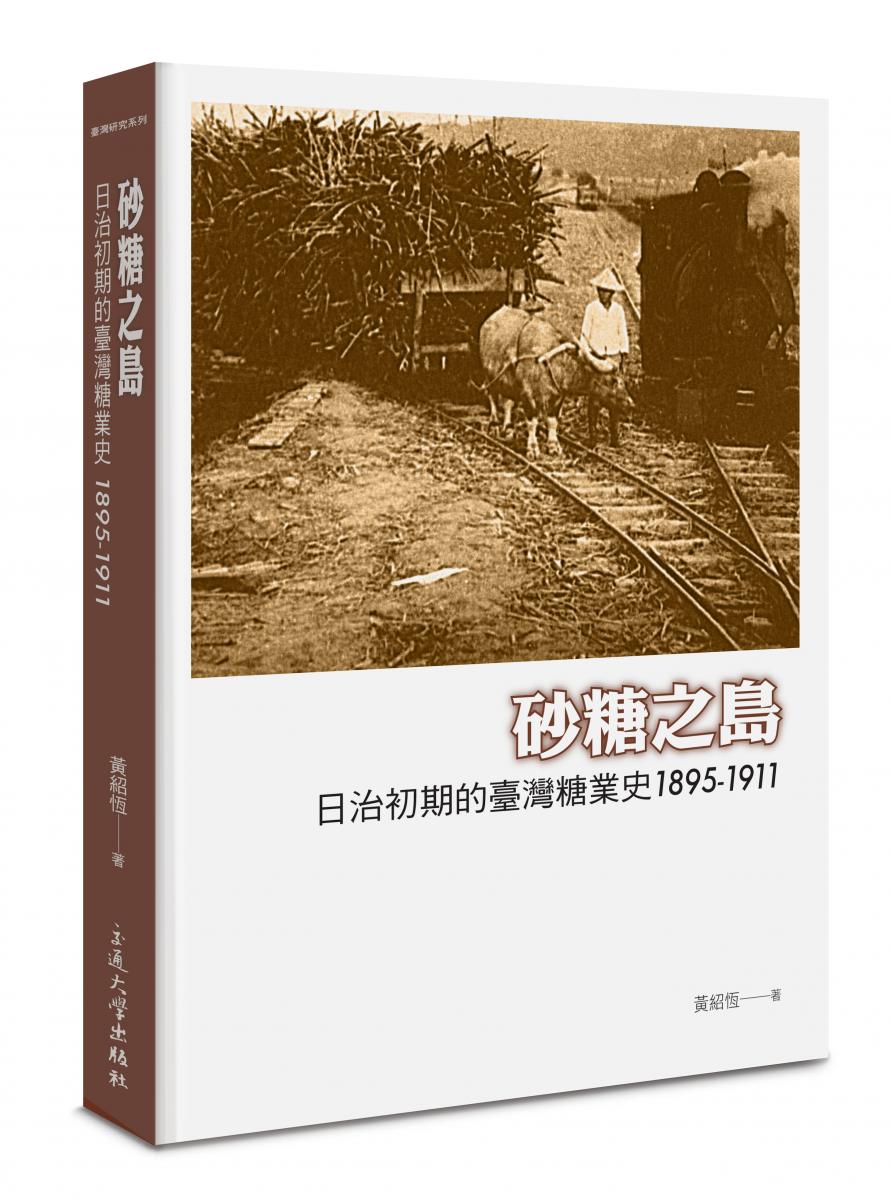
Sugar Island: The History of Taiwan Sugar Industry During the Early Years of Japanese Rule, 1895-1911
Publication Date|2019-03-27
Authors|Shaw-Herng Huang
Press|National Chiao Tung University Press
ISBN|9789578614277
Synopsis |
From the context in Capitalism to Contemporary Sugar Industry in Taiwan
Due to the Geographical Discovery of the 15th century, sugar has become a world commodity, profoundly affecting the contemporary history around the world. Taiwan has also entered the stage of world history because of sugar. Its importance has not lasted until the 1960s. Before the end of the Second World War, Taiwan was the foundation in modern sugar industry in Japan.
This book discusses the establishment of Taiwan's modern sugar industry in the early days of the Japanese occupation, covering the commencement Adequate Regulation of Taiwan's sugar industry from the Dutch East India Company to the initial development in the 1860s. It then explains the Required Regulation of the sugar import trade deficit caused by the opening by Japan which was transformed into the Post Sino-Japanese War development of Taiwan's modern sugar industry.
Although there were equipped with mature mechanical techniques in sugar industry in Taiwan in the early days of Japan-Ruling Era, it was still difficult to control the localsmall-scale farming economy that has taken root and grown in Taiwan for more than200 years. However, the Sugar Club has relied on the sugar policy of the Governor's Office of Taiwan, which has achieved considerable success in the acquisition of rawmaterials through those policies. However, these policies have also become the bottleneck for the development of sugar companies, making the Taiwanese sugar industry in the Japanese occupation period unable to operate independently in the country.
作者簡介 |
黃紹恆
國立交通大學客家文化學院院長、人文社會學系教授。
新竹縣人,國立臺灣大學經濟學系畢業,東京大學經濟學碩士、博士。曾任國立政治大學經濟學系副教授及教授、國立暨南國際大學歷史研究所兼任教授、東京大學社會科學研究所客座教授。著有《臺灣經濟史中的臺灣總督府:施政權限、經濟學與史料》(遠流,2010),《臺灣社會經濟史》(與陳鴻圖、林蘭芳合著,國立空中大學,2012);〈日治初期三井物產在臺商業買賣之展開〉(許雪姬主編,《臺灣歷史的多元傳承與鑲嵌》,中央研究院臺灣史研究所,2014),譯有石井寬治《日本經濟史[第2版]》(五南,2009)等書。
More Information |
Sanmin https://www.sanmin.com.tw/Product/index/007152543
NCTU Press https://press.nycu.edu.tw/web/product/product_in.jsp?sub_id=DM1691121128777&pd_id=PD1690000000314
Eslite
Kingstone https://www.kingstone.com.tw/basics/basics.asp?kmcode=2014810013974
Books.com https://www.books.com.tw/products/0010816737
Govbooks https://www.govbooks.com.tw/books/121371
Taaze https://www.taaze.tw/goods/11100872051.html
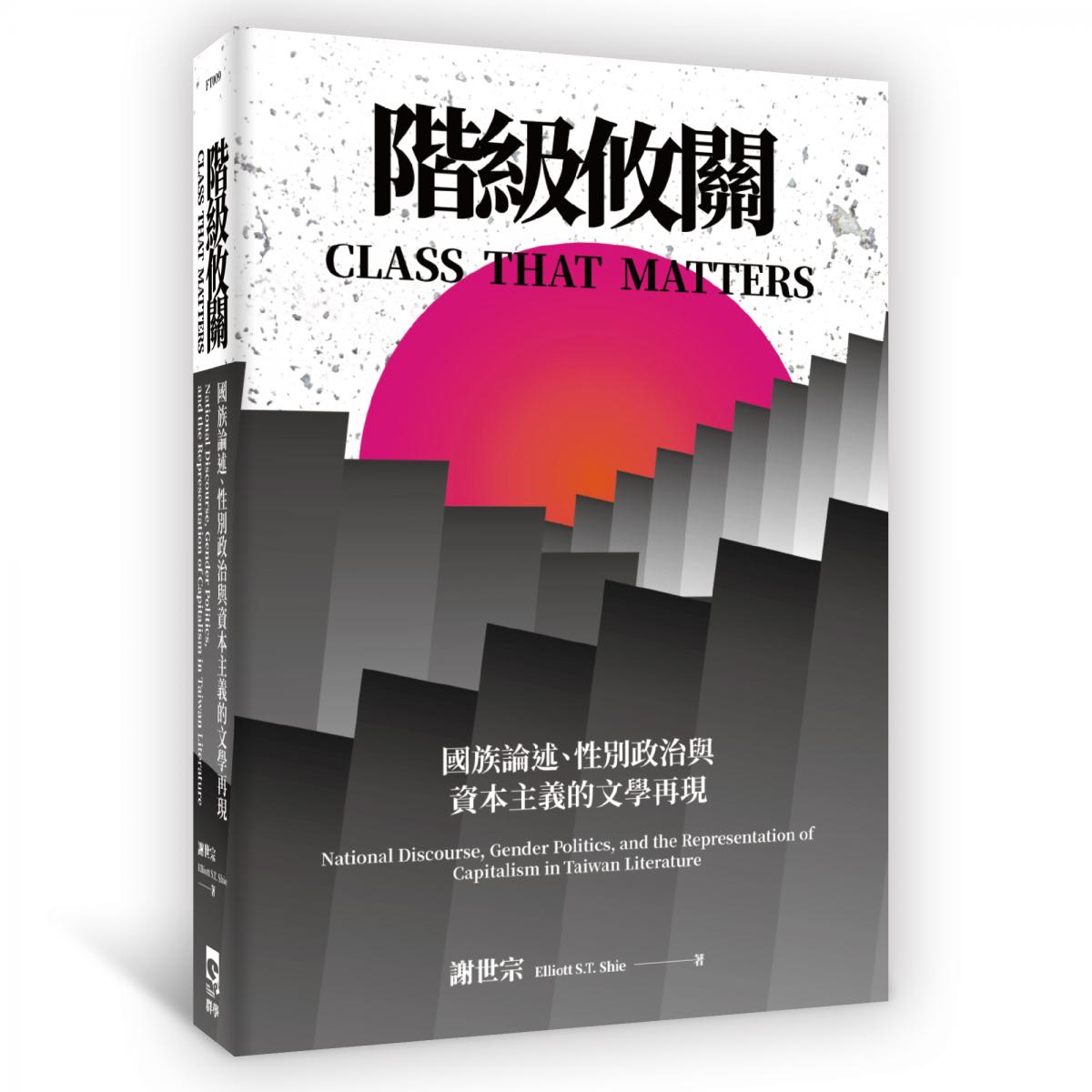
Class That Matters: National Discourse, Gender Politics, and the Representation of Capitalism in Taiwan Literature
Publication Date|2019-03-28
Authors|Elliott Shr-tzung Shie
Press|Socio Publishing
ISBN|9789869747424
Synopsis |
At the onset of the twenty-first century, postcolonial theory that has been indiginized in Taiwan for nearly three decades is far from losing its discursive significance. Postcolonial theory was first introduced to Taiwan in the 1990s, and since then, it has continued to generate considerable academic interest, informing debates about feminism, queer theory, and aboriginal studies.
While postcolonial theory in Taiwan has occupied an important discursive space within the field of literary criticism, one important dimension that seems missing from the debates is class. By embracing the trialectics of national discourse, gender politics, and critique of capitalism, this book seeks to explore the degree to which the concept of class informs Taiwanese nativist literature by writers such as Huang Chunming, Wang Zhenhe, Chen Yingzhen, Wang Tuo, and Yang Qingchu. It further hopes to illustrate that the term of “colonial economy” that featured prominently in the debates over Taiwanese nativist literature in the 1970s underpins the way nativist literature reflects and responds to the politico-economic circumstance at home and abroad.
By way of close readings of representative works of nativist literature, this book rethinks the efficacy of applying the discourse of “economic colonialism” to twenty-first century Taiwan. By combining the postcolonial discourse with an alternative perspective on class, the author hopes to propose a new discursive framework to discuss the challenges posed by a new military and economic power not far from Taiwan that increasingly exerts influence over Taiwan’s political autonomy.
Keywords: postcolonialism, nationalism, class, capitalism, nativist literature, colonial economy
Author |
Elliott Shr-tzung Shie received his PhD from the Department of East Asian Languages and Literatures at Yale University and is currently an Associate Professor for the Graduate Institute of Taiwan Literature at National Tsing Hua University in Taiwan. His research interests include postwar Taiwanese fiction, the Taiwan New Cinema, literary theory and cultural studies. He has published academic articles both in Chinese and English and a textbook entitled Film and Visual Culture: Reading the Classics of Taiwan Cinema (Taipei: Wunan, 2015). He is also writing a monograph on Hou Hsiao-hsien’s oeuvre.
Contents |
Introduction: The Trialectics of Nationalism, Gender, and Capitalism
Chapter 1: Colonial Effeminism and Nationalist Masculinities: The Economy of Desire in Taiwan’s Nativist Literature
Chapter 2: Economic Discourse, Mass Consumption, and Imported Modernity:
Taiwanese Colonial Economic Fiction and Its Gender Subtext
Chapter 3: Transnational Capitalism and the Spirit of Rationality:
The Prototype of Entrepreneurs in Wang Zhenhe’s and Huang Chunming’s Literary Works
Chapter 4: Focusing the Lens on Taiwan’s Capitalism under Globalization:
Rereading Wang Zhenhe’s Rose, Rose, I Love You
Chapter 5: Writing and Self-Positioning of a Nativist Intellectual: Space, Class, Generation, and Gender in Wang Tuo’s Short Stories
Chapter 6: The Political Economy of Love, Sex, and Marriage:
A Study of Yang Qingchu’s Anti-romantic Fiction
Chapter 7: Entrepreneurial Management, Gender Division, and the Representations of the National Capitalist Class: A Comparative Study of Yang Qingchu and Chen Yingzhen
Conclusion: What is Colonial Economy? Rethinking the Critical Perspective and Limits of Taiwanese Nativist Literature
More information |
Books.com https://www.books.com.tw/web/sys_serialtext/?item=0010817489
Taaze https://www.taaze.tw/goods/11100872606.html
Eslite
Sanmin https://www.sanmin.com.tw/Product/index/007157094
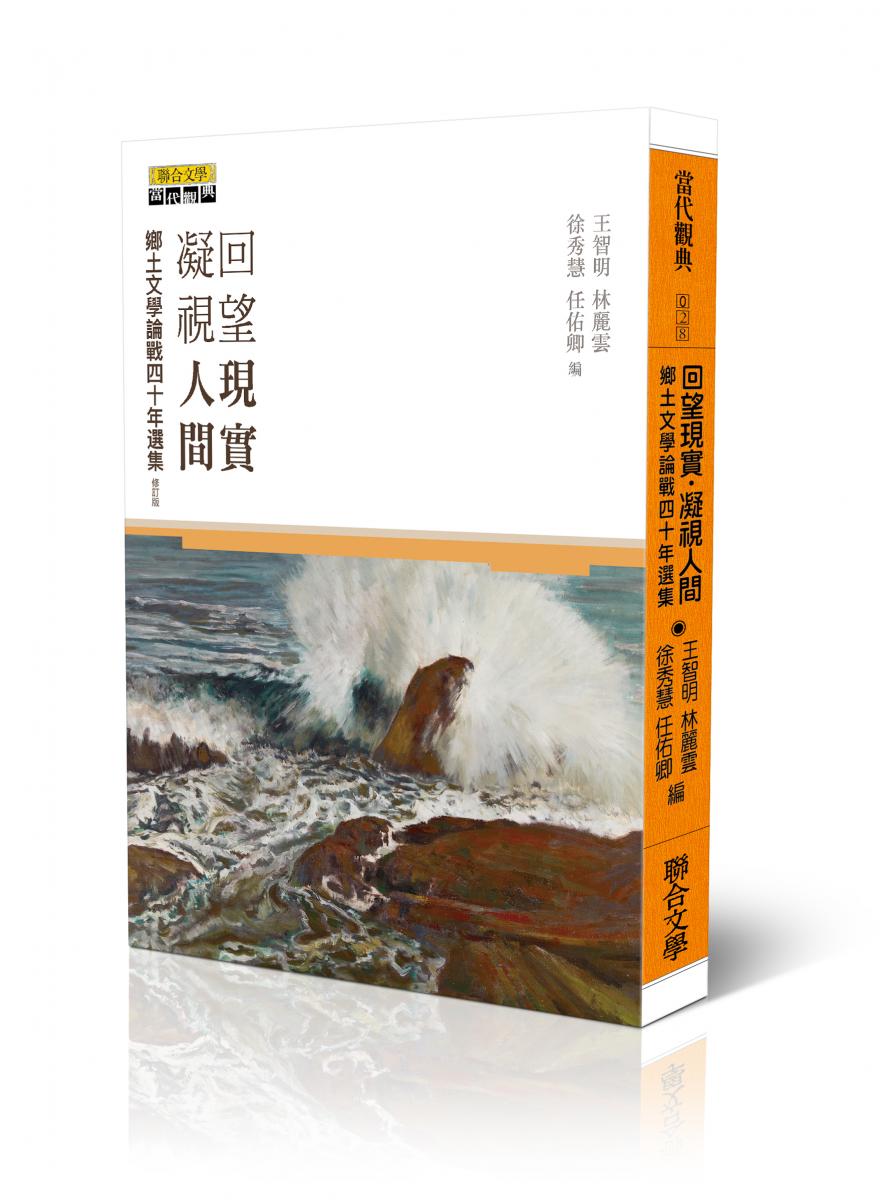
Reviewing Reality, Regarding Humanity: Essays on Forty Years of Nativist Literature(Revised edition)
Publication Date|2019/03/23
Authors|Li-Yun Lin, Chih-Ming Wang, Hsiu-Hui Hsu, and Im Woo Kyung
Press|UNITAS Publishing
ISBN|9789863232995
Synopsis |
Taiwan's “nativist literature debate” took place between April, 1977 and early 1978. This was an ideological debate in the name of “literature,” and also a second time an ideological struggle started around the idea of the “native” (xiangtu) in Taiwan. An earlier “nativist literature debate” took place in the 1930s, at a time when the “native” meant Taiwan as a colony, and the object of criticism was Japanese colonialism. The core values of the 1977 “nativist literature debate,” on the other hand, were anti-empire, anti-colonialism, and nationalism, and the debate challenged the sovereignty of the anti-communist/pro-US Kuomintang. Articles in this book cover mainly the 1977 “nativist literature debate,” especially on the nativist side. This book also includes one article on the 1930s debate, as well as reflections on the 20th and 30th anniversaries of the later debate.
Editors |
Chih-Ming Wang received his PhD in Literature from the University of California, Santa Cruz. He is currently Associate Research Fellow at the Institute of European and American Studies, Academia Sinica, and Associate Professor at the Interdisciplinary Program of Humanities and Social Sciences, National Tsing Hua University and Institute of Social Research and Cultural Studies, National Chiao Tung University. His research focuses on Asian American literature, cultural studies, and the history of academic institution and thought. He is the author of Transpacific Articulations: Student Migration and the Remaking of Asian America (University of Hawaii Press, 2013) and editor of Precarious Belongings: Affect and Nationalism (London: Rowman and Littlefield International, 2017). He is currently working on the institutionalization of foreign languages departments and the history of thought.
Hsiu-Hui Hsu received her MA in Chinese Literature from Tamkang University and her PhD in Chinese Literature from National Tsing Hua University. She is currently Associate Professor at the Graduate Institute of Taiwanese Literature, National Changhua University of Education. Her research focuses on postwar Taiwanese literature, leftist literature, Chinese modern literature, and contemporary literary thought. She received the Modern Literature Research Award from the Council for Cultural Affairs. Her publications include Postwar Taiwan’s Cultural Realm and Literary Thought (1945-1949) and Taiwanese Literature Studies Across Borders: Reflections on Nativism, Leftism, and Modernity.
Li-Yun Lin received her PhD in Anthropology from the School for Advanced Studies in the Social Sciences. She is currently a researcher at the Center for Asia Pacific/Cultural Studies at National Chiao Tung University. Her translation works include the African novels Allah n'est pas oblige and En attendant le vote des bêtes sauvages. She has participated in the long-term research project titled Oral History of Postwar Taiwanese Leftist Activism: Yingzhen Chen as a Clue since 2013. She is the author of Searching for Wu Yaozhong’s Paintings: Stories of a Realist Artist (2012).
Im Woo Kyung received her PhD in Contemporary Chinese Literature from Yonsei University. She is currently Professor at the Academy of East Asian Studies, Sung Kyun Kwan University. Her research focuses on East Asian nationalism and gender studies. She is currently working on issues of comfort women in Japanese military and citizen mobilization during the War to Resist US Aggression and Aid Korea. She is the author of National Narratives and Gender in Modern China. She edited Emergence of “Cold War” Asia: New China and the Korean War and Moving Asia: Post-Cold War Culture Politics and Exchange. She translated Houying Dai’s novel Death of Poet, Eileen Chang’s novel Naked Earth, and Zhaotian He’s collection of essays The Unconscious Thought of Contemporary China.
Table of Contents |
Preface
Volume I: Context
On Literature in Taiwan / Sung-Fen Kuo
The Return of the Chinese Standpoint: On Collection of Essays on Nativist Literature by Tiancong Wei / Qiuyuan Hu
Volume II: The Debate
Literature: From the Society, Reflects the Society / Yingzhen Chen
“Realist Literature,” Not “Nativist Literature”: A Historical Analysis of Nativist Literature / Tuoh Wang
Introduction to Taiwanese Nativist Literature / Shitao Ye
The Blind Spot in Nativist Literature / Nan-ts’un Hsu
On Nationalism and Colonial Economy: An Interview with Chiuyuan Hu / Xia Chao Monthly
Our Ethnicity, Our Culture / Tiancong Wei
The Bell Rings Everywhere: Nativist Literature is Dead / Ting Nan
Volume III: Reflections
Imagining the Native, Imagining Communities: Regarding the Idea of the Native in Taiwan under Japanese Occupation / Shu Shi
Native Before the Local: On the Frustration of a Potential of Thought / Tsai-Chueh Lin
Nativist Literature and Taiwanese Modern Literature / Cheng-Hui Lu
The “Native” in Nativist Literature / Cheng-Hui Lu
The China Complex in Nativist Discourses: The Nativist Literature Debate and Xia Chao / Shan-Nong Yen
Nativist Literature in the Past Twenty Years / Jui-Chin Peng
.jpg)
Journal Issue: ROUTER: A Journal of Cultural Studies, Issue 27
*本刊為臺灣人文學核心期刊(THCI)與臺灣社會科學核心期刊(TSSCI),並獲2016-2017年科技部人文社會科學研究中心,人文社會科學期刊綜合類評比:第二級
本期專題「營區與邊界」由本刊編委清大社會所陳瑞樺教授協助規劃和推動,從法國思想家阿吉耶(Michel Agier)的兩篇思想翻譯─〈生命權力以其敏感形式來檢驗:當代異質空間民族誌計畫的簡要導論〉與〈製作不受歡迎者〉─出發,我們可以清楚看到阿吉耶是如何從「不受歡迎者的製造」這個命題上展開他的當代民族誌觀察,從而在難民問題上重新開發與整合傅科(Michel Foucault)與阿岡本(Giorgio Agamben)的思想視野。為了讓讀者對阿吉耶的思想有更充份的認識,我們邀請陳老師撰寫專題導言〈在共同世界的邊緣探問生命政治:阿吉耶的城市人類學與難民營研究〉,並製作了一份阿吉耶著作目錄。
專題還包括了四篇學術論文與三篇評論。趙中麒聚焦在難民營內的物質與社會佈局,來探究克倫難民如何在流亡中凝聚民族認同和維繫民族文化。潘美玲則討論流亡藏人如何在尼泊爾和印度的難民營區內透過毛衣與地毯的製作與貿易,建立自主自給的經濟收入,並藉之實踐西藏意識。洪伯邑和練聿修將我們的視野從難民和營區轉向「物」的跨界移動與變身,從而提供了另一個理解營區與邊界的方法。曾維龍藉著討論馬來亞西華人「動地吟」這個為期25年的詩歌朗誦活動,曾維龍指向了邊界性社群如何定義自身,介入當地社會的可能。三篇評論文章則為整個專題補充了更豐富的思想元素:洪世謙的書評深入了阿吉耶的思想、朱元鴻介紹了另一位值得敬重與懷念的思想家包曼(Zygmunt Bauman),柯能源的影評討論2016年獲得第66屆柏林影展金熊獎的紀錄片《海上焰火》(Fire at Sea, 2016)。
*文化研究學會會員贈書近日內將寄送,若需購買請洽國立交通大學出版社。
| Contents
Editorial: Exceptional Spaces, Tentative Locales
Academic Paper
Disquisition: Camps and Boundaries
Cultural Praxis and Nationalist Movement of Myanmar Karen Refugees/ Chung-Chi CHAO
Practicing “Tibetanness” in the Market Place:
Refugee Economy of Exiled Tibetans in India and Nepal/ Mei-Lin PAN
Mobility, Bordering, and the Contested Localness of the Tea Trade between Taiwan and Vietnam/ Po-Yi HUNG, Yu-Hsiu LIENG
The Transition of Malaysian Chinese Society in “Post-Operasi Lalang” Era:
A Case Study on the ‟Dong Di Yin” Poetic Group/ Wen-Loong CHOU
Commentary and Reply
The Time of the Poor:
“Earth-Shaking Recitation” as Literary Activism/ Kim Tong TEE
Research Issue & Note
Domesticating Water, Domesticating Persons:
The Face-saving Project and Technological Performance of Tap-water Drinking Programs in Taipei/ Chih-Hung WANG, Jo-Tzu HUANG
Translation: Michel Agier
Introduction: Inquiring about the Bio-Politics from the Edge of the Common World:
Michel Agier's Anthropology of City and Camp Study/ Jui-Hua CHEN
Michel Agier, “Le biopouvoir à l’épreuve de ses formes sensibles. Brève introduction à un projet d’ethnographies des hétérotopies contemporaines”/ translated by Jui-Hua CHEN
Michel Agier, “La fabrique des indésirables”/ translated by Jui-Hua CHEN
Bibliography of Agier/ Chia-Chi TSENG, Jui-Hua CHEN
Commentary
Book Review
A Review on Michel Agier’s Borderlands: Towards an Anthropology of the
Cosmopolitan Condition/ Shih-Chian HUNG
In Memory of Zygmunt Bauman: A Life of an ever Stranger-Critic/ Yuan-Horng CHU
Film Review
Visual Ethics of Regarding the Pains of the Other:
The Montage of Life in Fire at Sea/ Neng-Yuan KO
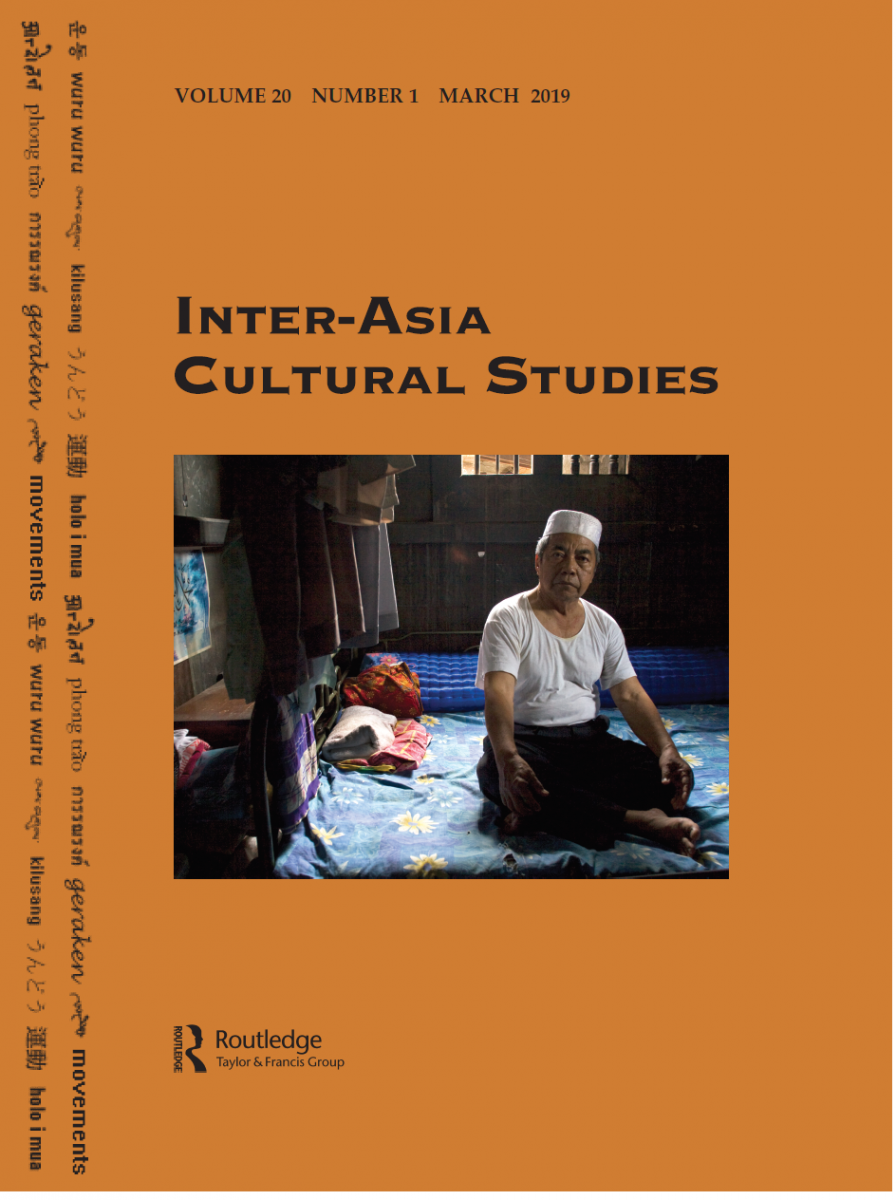
【出版】Inter-Asia Cultural Studies: Movements Volume 20 Number 1 March 2019
Editorial statement
Inter-Asia Cultural Studies, also known as the Movements project, is a transborder collective undertaking to confront Inter-Asia cultural politics.
The question of culture is among the most important yet difficult facing Inter-Asia today. Prolonged histories of feudal ideology, patriarchy, heterosexism and, within as well as between countries, racism and discrimination against subjugated peoples continue to block struggles for popular democracy. Long-term complex-antagonisms generated by the uneven histories of global capitalism, colonialism and imperialism, the imposed nation-state structure and regressive forms of nationalist identity politics have rendered meaningful dialogues within the region very difficult. At the same time, the globalization and regionalization of technology, economy and cultural production, and the recent breakdown of the Cold War structure, have opened up a unique moment for dialogues within Asia and internationally. Unfortunately, this potentially generative moment has been met with triumphalist sentiment.
Since the 1980s, a pervasive rhetoric of the “rise of Asia” has come to mean more than the concentrated flow of capital into and out of the region. It has come to constitute a structure of feeling that is ubiquitous yet ambiguously felt throughout Asia. Historically, this feeling of the “rise of Asia” is complicated by the region’s colonial past. While Asia’s political, cultural and economic position in the global system will continue to fluctuate, there is a need to question and critique the rhetorical unities of both the “rise” and of “Asia.” Wealth and resources are unevenly distributed and there is no cultural or linguistic unity in this imaginary space called Asia. On the other hand, no matter whether there are common experiences shared by sub-regional histories, there is an urgent need for forging political links across these sub-regions. Hence, “inter-Asia” cultural studies.
The politico-economic transformations across the region in the Post Cold War era have engendered both new social movements and critical cultural studies as forces of decolonization. These forces have given rise to alternative modes of knowledge production, and yet no adequate means exists for the circulation of intellectual work and for interaction among critical intellectuals.
It is at such a pivotal conjuncture that Inter-Asia Cultural Studies has emerged as part of a movement for the ongoing construction and reconstruction of critical Inter-Asia subjectivities. It gives a long overdue voice to the intellectual communities in the region and recognizes its own existence as an attempt to continue critical lines of practices. The journal’s aim is to shift existing sites of identification and multiply alternative frames of reference: it is committed to publishing work not only out of “Asia” but also other coordinates such as the “third world.” Its political agenda is to move across: state/national/sub-regional divisions, scholarship and activism, modalities/forms of knowledge, and rigid identity politics of any form. These movements actively engage with local cultural politics within an ever-changing international environment, where politics is increasingly operating in the sphere of culture, under the dictates of a global cultural industry, mediated by new electronic and information technologies, and shaped by different forms of representation – visual, virtual, financial. This new situation has brought political economy, culture and politics together in different ways, and forced us to create new ways of thinking and acting. For this reason the project is more interested in generating new questions or finding ways of asking questions differently, than providing fixed answers.
Toward these ends, Inter-Asia Cultural Studies will serve as a link between critical intellectual groupings; we are actively building connections with journals and groups in different locales.
Kuan-Hsing Chen and Chua Beng Huat
Essays
Reading Myanmar’s inland fisheries: postcolonial literature as theoretical lens
Stephen CAMPBELL
Fear as political dynamics: Chinese peasant workers’ struggle over social security
Wei SHI
Creative labor as moral and ethical subjects: Creativity City Yokohama, Japan
Changwook KIM
Autogenous culture as political form: explorations through participatory art in Singapore
Felicia LOW
Imagining accidental fetal citizens: pregnant Mainland women and the cultural politics of birthright citizenship
Tsung-yi Michelle HUANG, Chun-kai WOO, Yen-fu LAI
Is the postwar state melting down?: an East Asian perspective on post-Fukushima Japan
NAM Kijeong (translated by LEE Min Jeong, NAM Kijeong, Benjamin A. ENGEL)
Visual essay
Photography and Chineseness: reflections on Chinese Muslims in Indonesia
ZHUANG Wubin
Third-world connection
Yugoslavia: other modernities, other histories
Bojana PIŠKUR
Art education
Crisis of the human and responsibilities of art/education
GAO Shiming (translated by WANG Chih-ming)
Field note
Chongming islanders in great Shanghai: an investigation of cultural ecology
ZHU Shangje (translated by ZHU Qiaolian)
A thought crime in a hyper-royalist nation: Notes on Prof. Thongchai Winichakul’s lecture on the Lese Majesty law in Thailand
/ Show Ying Xin
After delivering his keynote speech at the International Conference of Cultural Studies Association on March 10, in which he, as a historian and a survivor of the 1976 Thammasat University massacre, gave a moving lecture about the unforgetting of the incident, Prof. Thongchai Winichakul turns to the contemporary social condition in Thailand in the lecture next day. He talks about the Lese Majesty law (hereafter LM), or Article 112, a law which seems to be an “exception” to the normative rule of law.
The LM law states that “Whoever defames, insults or threatens the King, the Queen, the Heir Apparent, or the Regent shall be punished with imprisonment of three years to fifteen years”. The number of LM charges has skyrocketed after the military coups in 2006 and 2014, which shows that this highly-controversial legal instrument has been used to suppress opponents and public expressions in the name of protecting Thai monarchy. Significantly, most people arrested for the crime confessed, even though all of them denied committing any wrongdoing, nor were they physically abused by the police.
Prof. Thongchai first traces the history of the LM law. In old Siam, when the state and the monarch were identical, LM was part of treason though it was less severe if compared to rebellion or defiance of the royal order. After the 1932 revolution which transformed Thailand into a nation of constitutional monarchy, LM was no longer seen as treason and criticism towards the monarchy was allowed if it was for public interests. Nevertheless, after the 1947 coup generated by the alliance between the military and the monarchists, the 1949 constitution stated clearly that the monarchy is inviolable. Article 112 in the new criminal code of 1957 thus made LM a crime against national security, no longer an offense to the monarch as a person. Since then, Thai politics and culture have been caught in the condition of what Prof. Thongchai describes as “hyper-royalism”, the permeation of royalism in everyday life which often involves exaggeration and exaltation.
After the coups in 2006 and 2014, LM has been abused to serve the purpose of the junta regime which is to intimidate and suppress the critics. Problematic interpretations of the law, unjust process and excessive punishments have made LM the most notorious thought crime in contemporary Thailand. Most violators are denied bail and would be detained during the police investigation for maximum of 84 days. Moreover, under the state of emergency (which was declared after every coup), LM cases will be heard, usually secretly, in the military court which is time-consuming and no appeal process is allowed. More terribly, the harsh sentence (the highest in history is seventy years in jail, for posting/sharing seven Facebook messages) compels the accused to confess as it will reduce the sentence by half.
According to his research, Prof. Thongchai notes that most of those charged for LM confessed to the crime not because of being physically tortured. Reduction of prison term after confession is one of the reasons, but Prof Thongchai argues that the terrible condition in Thai prison is probably the most decisive factor. However, scholars in criminology seem to neglect the fact that the ideas of “modern prison” are not necessarily applicable to prisons in many countries including Thailand. Also, legal culture and systems in Siam civilization were very much based on Hindu-Buddhist philosophy, and this only nation in Southeast Asia which had not been officially “colonized” undertook a rather different path from its counterparts in the transformation of a modern nation.
It is noteworthy that after the death of the late King Bhumibol in 2016 and the change of political situation in Thailand (an election to be held on 24 March, first in eight years), there were signs of changes regarding the LM charges as the number of arrests dropped off since early 2018. However, it is still too early to judge.
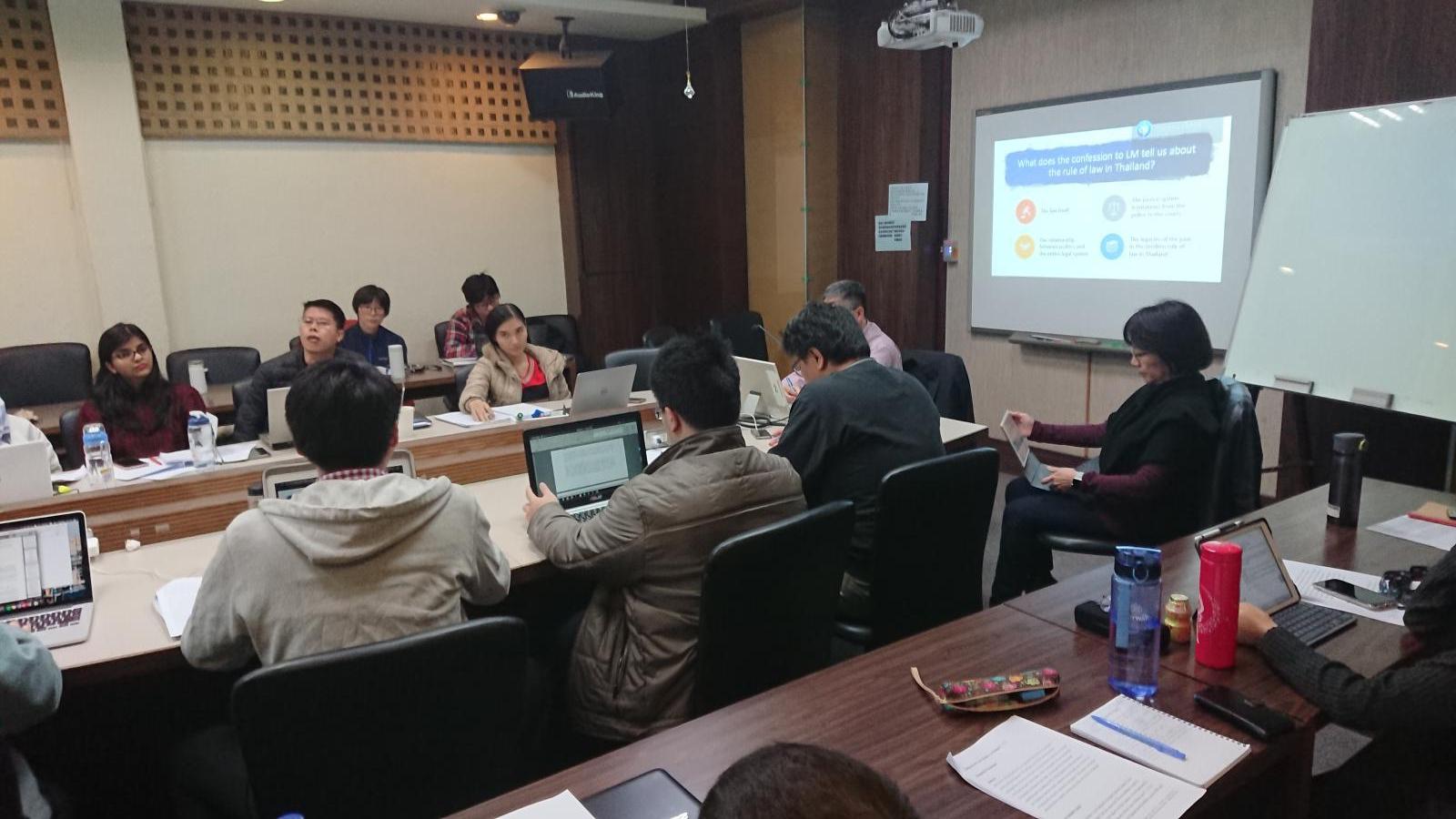
.jpg)
音聲攸關——郭詩詠「上海新感覺派小說中的聲音景觀」演講側記
講題:上海新感覺派小說中的聲音景觀
講者:郭詩詠(香港恒生大學中文系助理教授)
時間:2019年3月12日(週二)15: 30-18: 20
地點:清華大學人社院C402室
主持:羅仕龍(清華大學中文系助理教授)
主辦:國立清華大學中文系、國立清華大學亞太/文化研究中心、台灣聯合大學系統文化研究國際中心、亞際文化研究國際碩士學位學程(台灣聯合大學系統)、亞太/文化研究室、國立交通大學文化研究國際中心
紀錄:宋玉雯(交通大學文化研究國際中心博士後研究員)
講者一開始即清楚述明本次演講所欲把握的大要:(1)以劉吶鷗、穆時英、施蟄存的小說為例,分析上海新感覺派小說中的聲音景觀;(2)初步歸納和分析新感覺派小說中的聲音景觀,考察作家如何設計各種聲景在小說文本中建構摩登上海;(3)從機械複製聲音媒介切入,從另一角度討論1930年代上海新感覺派小說寫作與現代資本主義的關係,藉此了解當時中國的世界主義和現代性的生成。而上述的內容旨要,則是要透過考察以下三點來加以解析:(1)作家如何感知及理解資本主義與消費文化;(2)小說聲音景觀如何為讀者帶來屬於現代的都市新感覺;(3)機械複製聲音媒介如何啟發作家的故事構思和敘述手法。
講者首先闡述「soundscape」(常譯:聲音景觀,聲景,音景)的研究意涵,借重日本學者吉見俊哉的著作《聲的資本主義:電話、RADIO、留聲機的社會史》(李尚霖譯;台北:群學,2013年6月),指出「聲景」是一有關聲音的文化及環境研究的概念:「聲景是用聲音界定空間屬性,一段在特定空間錄製的環境聲音,能產生對該空間的認知,因此也是種社會文化文本,可反映時代狀況。」繼而具體進入上海新感覺派作家作品,從「聲景」的視角,重新解讀穆時英、劉吶鷗、施蟄存的小說:新感覺派小說的「聲音」,形象地表現了城市的速度,流行曲與慾望的想像。
以穆時英的小說為例,其創作經常揉合外國流行曲和間諜小說文類,文本中歌曲的敘事功能,幾乎等同於現代電影裡的歌曲敘事,對當時歐美和東亞地區流行音樂的徵引和轉化,則不但使小說呈現出高度風格化的氛圍,也突顯了小說主題並建構了人物的慾望和想像。要者如〈某夫人〉,小說中採用的〈銀座行進曲〉,是1928年日本的流行曲,1920年代日本有「行進曲」的潮流,透過置入當時東亞流行音樂文化語境,開啟讀者的異國和情色想像,文本中聲畫分離的場景,彰顯出視覺缺席的慾望客體,這則「異國風情的粉紅故事」,輾轉傳達出多元複雜的文化身分想像:面向國際、全球流通的世界主義文化身分。而電話作為一種新科技的發明和普及,也使得新感覺派的小說得以產生新的情節構思和敘述設置,比方:錯位式的「對話」(穆時英:〈五月〉),時空處理與敘述實驗(施蟄存:〈薄暮的舞女〉、〈在巴黎大戲院〉)等等,這樣的情節設計不可能在明清小說中出現。
有別於偏重視覺的地景研究,此次講座從聲景(soundscape)和聲音技術出發,探討上海新感覺派作家的創作,分析作家如何將嶄新的現代聽覺經驗納入其小說敘事,建構出複雜的跨文化互文性及慾望想像,藉以探看當時新感覺派小說中的文化政治,以及二十世紀三十年代上海的世界主義及現代性。透過此次講座,豐富了我們關於記憶政治的想像與探索,亦促進了諸如聽覺現代性和文化身份認同等課題的交流討論。
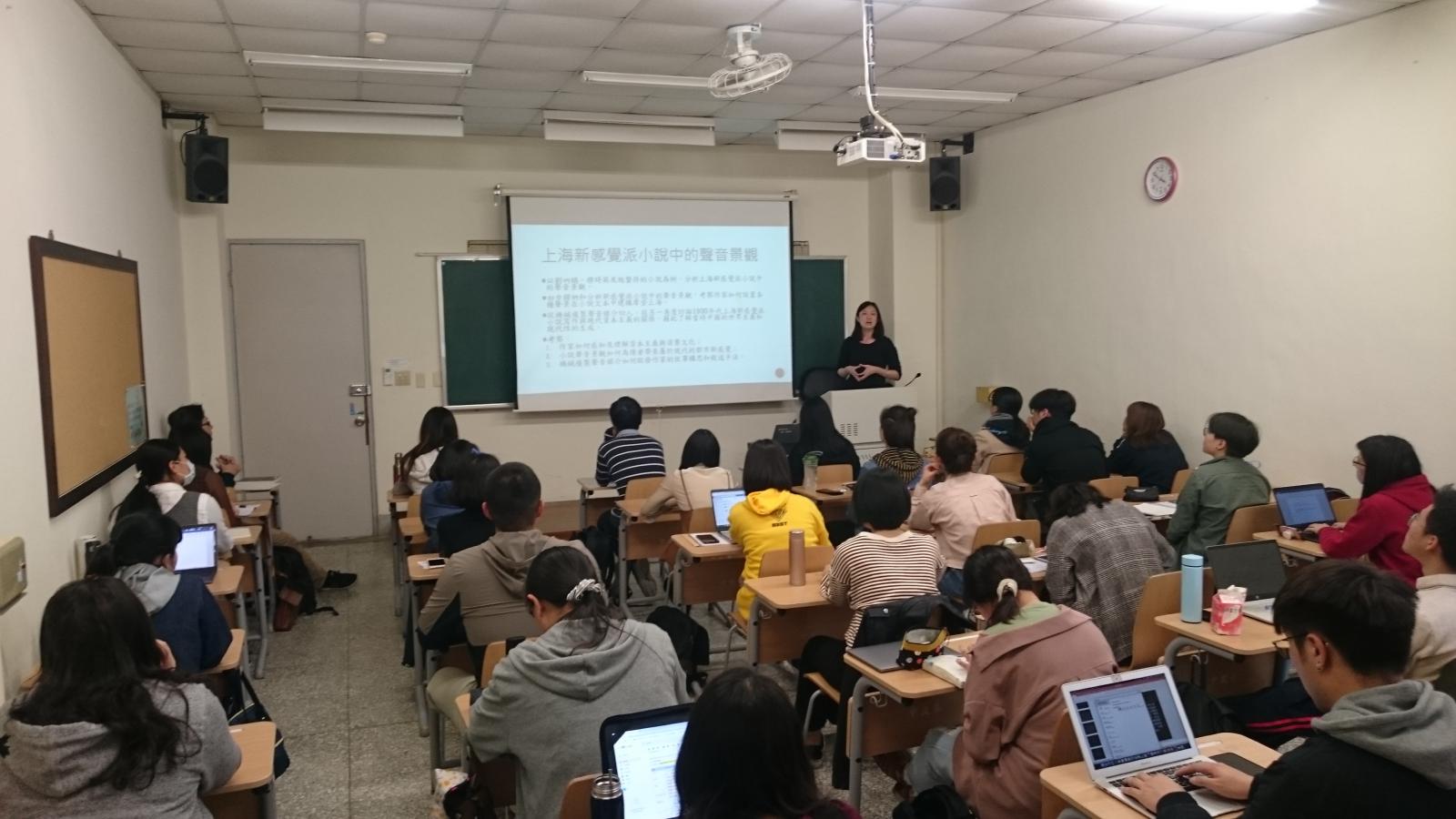
曙光的影子——張歷君演講側記
宋玉雯(交通大學文化研究國際中心博士後研究員)
講題:過渡時代的煩悶青年與民初知識份子的自殺論
講者:張歷君(香港中文大學文化及宗教研究系)
時間:2019年3月8日(週五)10: 10-13: 00
地點:清華大學人社院C404室
主辦:國立清華大學亞太/文化研究中心、台灣聯合大學系統文化研究國際中心、亞際文化研究國際碩士學位學程(台灣聯合大學系統)、亞太/文化研究室、國立交通大學文化研究國際中心
講者由1903年日本高中生藤村操「哲學的自殺」事件談起,當時瀰漫日本的國家主義和軍國主義思想,以及動盪的社會境況,讓當時的知識青年對生存產生種種疑問,而這樣的「煩悶青年」,同樣遍存於社會轉型期的中國,自殺在五四時期也成為一顯著的社會現象。抱病投入五四運動的北大學生林德揚,創辦了北京第一國貨店,其後勞苦病篤、感事傷時,在北京萬牲園投溪身亡的事件,引起輿論關注,其時具指標性意義的知識份子,如蔡元培、李大釗和陳獨秀等人,都有相關評論見諸報刊。
可謂是當時中國「煩悶青年」之一員的瞿秋白,對林德揚之死也給出了自己的看法。他認為值此國民性重估的時刻,許多青年感到陷於各種制度、舊習之中,竭力奮鬥屢受挫折,體會到社會的罪惡無法承受而萌生自殺之意,而這樣的痛苦和自殺的念頭實是一種覺悟的表現,但瞿秋白同時更指出,真正的覺悟應是感到奮鬥中的樂趣,在痛苦中尋找樂趣,並進一步指出所謂的「自殺之道」:向舊社會宣戰的青年,所為甘冒眾怒、所行皆是世人欲殺之事,無異走在自殺的路上。用李大釗的話或即是「青年自殺的流行,是青年覺醒的第一步,是迷亂社會頹廢時代裡的曙光一閃。我們應該認定這一道曙光的影子,努力向前衝出這個關頭,再進一步,接近我們的新生命。」(〈青年厭世自殺問題〉)
瞿秋白的「自殺之道」,其「自由神就是自殺神」的提法,如同李大釗筆下「曙光的影子」的意象,召喚著厭世青年瞿秋白「捨棄了黑甜鄉裡的美食甘寢」,到「罰瘋子住的」餓鄉尋找光明的真理(〈餓鄉紀程.緒言〉)。瞿秋白並不諱言其對於「新社會」的渴求是一種「新信仰」,瞿秋白所倡言的「自殺之道」,多少帶著宗教信仰的犧牲精神,他對於自殺和犧牲的看法,亦包含著他當時所接受的歷史唯物論思想,以及透過佛學所領會的柏格森生命主義。
早在前述1919年〈林德揚君為什麼要自殺呢?〉文中,便可見到瞿秋白引用柏格森生命哲學的觀點,探討自殺這種社會現象的成因。瞿秋白亦引用佛學的概念來闡釋柏格森,譬如以《圓覺經》的經文「欲因愛生,命因欲有」,闡述柏格森的「生命」概念,以佛學的「愛」增補和重寫了「生之衝動」(elan vital)這個概念,與此同時,瞿秋白亦反過來以「生之衝動」概念增補和重寫了佛經中對「愛」的負面理解,將「愛染」轉化為對生命的正面擁抱。再如,以「瀑流恒轉」來解釋「生命的巨流」,也是瞿秋白以佛家概念重寫柏格森哲學的明顯例子。實際上,五四的左翼知識份子,其思想的複雜組構,充滿著如今為冷戰固化的知識結構所難以理解的扞格和對立,例如佛學和唯物論何以能相融不悖?但這樣的雜揉共存,可能才是思想的實情。
此次講座將焦點集中於民初知識份子對「自殺」的思考和討論,並嘗試將當時知識份子們的思考,置放於更廣闊複雜的世界文學、國際左翼思潮和生命哲學的思想脈絡中加以考察,展示了民初知識份子在思考上與同代歐陸和日本思想家之間的跨文化聯繫和同步性。最後透過比較分析,勾勒出民初知識份子在「自殺」議題上所展示的獨特的中國思考模式,並借此進一步探討東亞生命主義的理論可能性。
取徑於具體事件和思潮的討論,此次演講演示了如何將習常歸於個人的情感情緒與行為、抉擇「公共化」,進而做一學術性的研究和論析,相信在講座課題針對性的知識內容之外,細心的聽眾也能對研究的方法有所收獲,而求索於這樣一個百年前的思想史事件,肯認那一道「曙光的影子」的真義,或也能帶給當前的「厭世代」青年,另一種知識安定和繼續前行的些許力量。
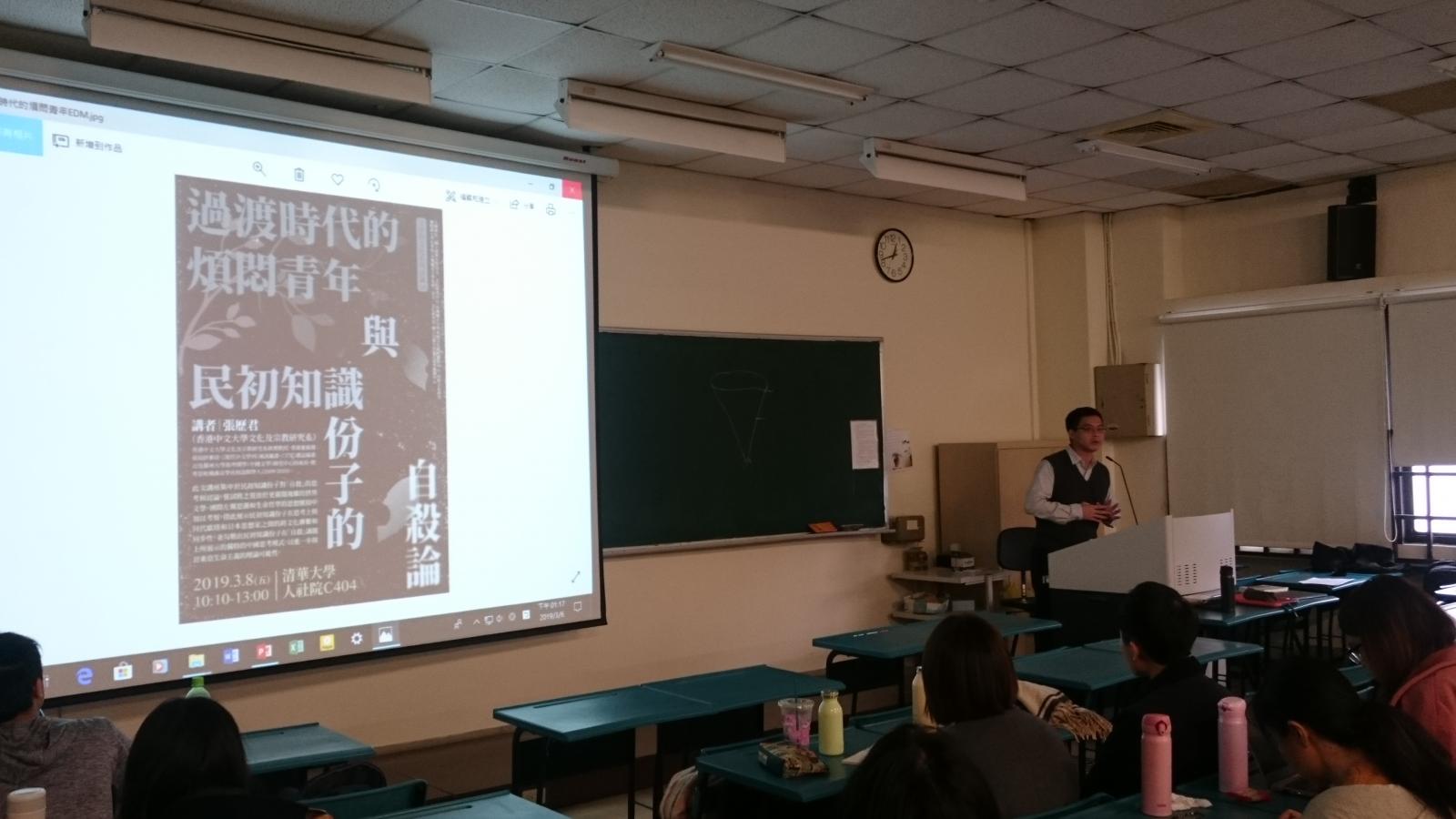
民族、階級、國家的糾結:中蒙劃界始末 - 劉曉原教授演講(2019年3月13日)側記
延光錫
第三世界的歷史中,二十世紀歷史所內含的特殊意義,應該在於歐洲現代性所隱含的對內/對外的矛盾被置於具有悠久歷史的第三世界的基體(溝口雄三)上而形成的矛盾的複雜性以及對此的主體性對付。歐洲現代性的內在矛盾是階級矛盾所造成的資本主義與社會主義之間的對立,而對外的矛盾則以殖民帝國主義與反帝國主義民族解放革命之間的矛盾得以具體化。第三世界透過超克資本主義、國民國家和國家間體系,而試圖建設另類經濟體制、國家形式和國際主義,以克服歐洲現代性的對外矛盾,即殖民帝國主義所造成的民族矛盾。
歐洲現代性在二十世紀政治領域中,貫徹了「國民國家」和「公民主體」如此這般的普遍主義。殖民/帝國主義以暴力貫徹如此普遍主義,以保障資本主義的超額利潤。此過程中,世界大體上根據自上而下的國民國家標準,重新被劃定疆界。而如同東亞各種分斷體制所呈現,多元歷史地理下積累的生活共同體所保持的民族性疆界被強迫重組。
不過,劉曉原教授的演講,從歷史學的角度,重新探討中國和外蒙古之間疆界有關爭論點,並提出不少論點,以複雜化東亞分斷體制認識。尤其,雖然屬於非歐洲世界,但外蒙古的歷史經驗不同於第三世界,沒有經歷過殖民,直接經歷了第二世界之延長的社會主義,因此外蒙古的歷史經驗成為透過反帝民族解放革命而成立的第三世界社會主義國家的極為有效的參照點。
概括地講,劉曉原的基本認識是中國與外蒙古之間在一九五〇-六〇年代得以解決邊界問題,意味著借助國內和國外因素而完成國家關係上的現代化。不過,此過程的歷史和現實背景因素格外複雜,包括中華民國到中華人民共和國的轉換、作為對外蒙古核心外部作用因素的蘇聯社會主義的演變、環繞如此過程的二戰過程中局勢轉變以及二戰後冷戰體制的展開等。
外蒙古曾經於一九二一年獲得俄羅斯的支持而獨立過。透過俄羅斯革命成為世界第一社會主義國家的蘇聯,在列寧領導的時期,站在以蘇聯為中心的社會主義革命擴散立場,將外蒙古視為布爾什維克革命模式的根據地,而到斯大林時期認識到第三世界反帝民族解放的獨自性和相對性,而將外蒙古視為緩衝區。可以說,比起列寧時期,斯大林時期的外蒙古,借助蘇聯對於世界認識的深化,成為更具實質意義的存在。
另外,中華民國於一九四五年簽訂中蘇條約承認外蒙古的獨立,不過經過國共內戰的勝利而掌握中國大陸的中國共產黨,比起國家間關係,更重視反映「階級解放」和「民族自決」等價值的革命黨之間的關係,即黨際關係,因此事實上延後「現代」國家間關係的建立。尤其,中國共產黨經由長征而深化了對於中國少數民族的認識,後來也反映在對於外蒙古的政策。一九五〇年代毛澤東的思維反映當時的區域歷史特定性:中國正在進行建設另類社會主義國家模式的實驗,而同時認知意味著建立「國家」的「自決」隱含的危險,而將「自治」放在「自決」前面。一九五〇年代中國與外蒙古之間的特殊貿易關係,即對於外蒙古的優惠政策就是如此中國和外蒙古關係的歷史特定性之反映。
比起國家,更重視民族和階級的中國走向,也成為大中華和大蒙古互相不矛盾的條件。也就是說,中國和外蒙古基本上比起劃定國家間的疆界線,更重視民族和階級的生活的恢復和保障。
但是,一九五〇年代中期以後,中國經歷了以一九五七年為轉折點的一個轉換,即在冷戰體制的封鎖之下,一邊對抗冷戰體制,一邊適應冷戰體制的政治經濟與軍事外交的「國家化/現代化」路線(錢理群的「五七體制」)。尤其,在經歷中蘇論戰的過程中,毛澤東的思維從教條主義批判過渡到修正主義批判。解決與外蒙古的邊界問題的一九五七-一九六二年恰好重疊於如此時期。我們可以把如此解決邊界問題視為國家間關係的「現代化」而加以肯定。不過,從批判歐洲現代性自上而下的貫徹之視角來看,如此「現代化」可視為主體性的弱化,即便「國家」層次加強主體性。
不過,如此對於現代性的肯定或否定,事實上無法把握住歷史上重要的一個層面。在劉曉原的講稿最後段落的周恩來和澤登巴爾的對話中,我們可以找到一個線索:
澤登巴爾:我們建設社會主義、共產主義的人民唯一的目的,是要清除以往的人剝削人的舊社會遺留的邊界。這是我們人民的願望。[……]
周恩來:最後就要世界大同了。在大同以前,要先把邊界弄好,以利共同合作。這也是辯證關係。
關鍵可能是如何從歷史內在的視角認識新的邊界如何清除舊社會所遺留的邊界,以解決人間的剝削,而且需要歷史內在辯證關係中認識如此變化。為此,我們需要對於疆界的新認識:當下被視為國民國家間的疆界線之各種國境其實有質的差異,從中不只存在自上而下的屬性,也存在根據區域歷史的主體性面向。而且,重新認識民眾生活社會史,應該成為如此區域性認識的基礎。
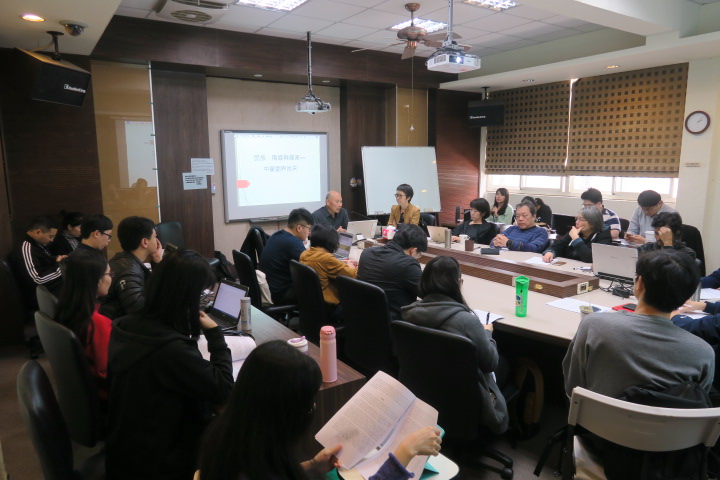
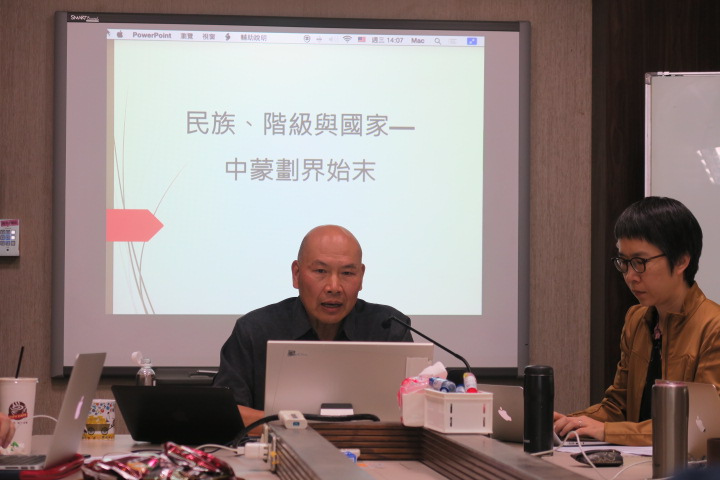
近期新聞 Recent News


Report|Conceptualizing Digital Governance in the Age of Semiconductors: A Critical Review of Keywords and Concepts
2025-12-03
more
Report| Book Launch: Nyanyian di Perantauan: Kumpulan Lirik Lagu Pekerja MigranIndonesia & Laporan Skena Musik di Taiwan 2024
2025-11-22
more